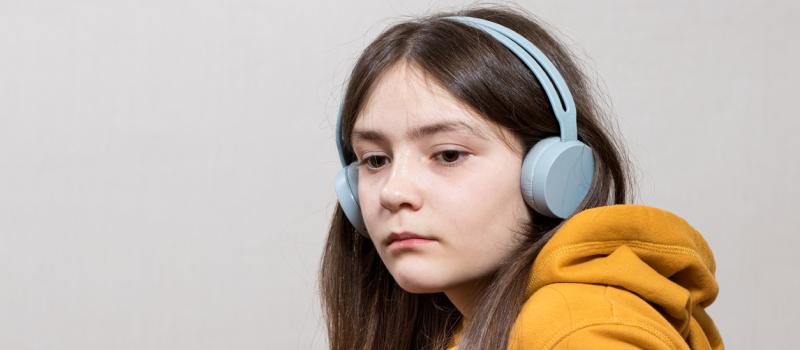
Table of Contents
Depression and Migraines: What’s the Connection?
Written By: Charlie Health Editorial Team

Clinically Reviewed By: Dr. Don Gasparini
August 1, 2023
7 min.
Not everyone with migraines will develop depression, but studies show an increased risk of depression in people with chronic or frequent migraines. Learn more about the link between migraines and depression here.
Learn more about our Clinical Review Process
Table of Contents
The relationship between migraines and depression
The relationship between migraines and depression is complex and multifaceted. Several studies have shown a clear association between the two conditions, suggesting that people who suffer from migraines are more likely to experience depression and vice versa. While the exact mechanisms linking migraines and depression are not fully understood, several factors may contribute to this relationship:
1. Neurobiological factors
Both migraines and depression involve disruptions in brain chemistry and neurotransmitter imbalances. Serotonin, a neurotransmitter that plays a key role in mood regulation, has been implicated in both conditions. Changes in serotonin levels can contribute to both migraines and depressive symptoms.
2. Shared genetic factors
Evidence suggests that genetic predisposition may play a role in the development of both migraines and depression. People with a family history of either condition may be at a higher risk of experiencing both.
3. Psychosocial factors
Living with chronic migraines can be emotionally taxing, leading to increased stress, anxiety, and frustration. These emotional responses may contribute to the development or worsening of depression.
4. Medication effects
Some medications used to treat migraines may have side effects that impact mood, potentially leading to depressive symptoms.
5. Inflammatory processes
Some research suggests that there may be underlying inflammatory processes common to both migraines and depression.
It’s important to note that while there is an association between migraines and depression, not everyone with migraines will develop depression, and vice versa. However, studies show that the risk of depression is higher in individuals who experience chronic or frequent migraines.
Join the Charlie Health Library
Get mental health updates, research, insights, and resources directly to your inbox.
You can unsubscribe anytime.
How common is depression in those with migraines?
As discussed, depression is a mental health disorder relatively common in individuals with migraines. Studies have consistently shown a higher prevalence of depression among people suffering from migraines compared to the general population. The number of people affected by migraines and depression can vary depending on who’s being studied and how researchers define both conditions.. However, the general trend is that those with migraines are at an increased risk of experiencing depression.
Here are some key findings from research on migraines and depression:
1. A systematic review and meta-analysis published in the Journal of Headache Pain in 2016 found that the overall prevalence of depression in individuals with migraines was approximately 32%. The study included data from multiple studies conducted across different countries.
2. According to the American Migraine Foundation, 50% of migraine patients reported experiencing depression, and 60% reported being diagnosed with an anxiety disorder.
3. A study published in the Journal of Affective Disorders in 2019 found that individuals with migraines were approximately twice as likely to experience depression compared to those without migraines, among other psychiatric comorbidities.
While this data confirms that there is an increased risk of depression in people with migraines, not everyone with migraines will develop this mental health condition. As discussed, various factors, such as genetic predisposition, personal coping mechanisms, social support, and access to healthcare, can influence whether someone with migraines also experiences depression
If you or someone you know is dealing with migraines and experiencing symptoms of depression, it's crucial to seek professional help from a healthcare provider. Managing both conditions effectively can improve the overall quality of life and well-being of the individual.
Treatment options for depression in those with migraines
The treatment of depression in individuals with migraines requires a comprehensive approach that takes into account both conditions' unique challenges. It's essential to work with healthcare professionals, such as neurologists, psychiatrists, and therapists, to develop a tailored treatment plan. Here are some common options for treating depression in those with migraines:
1. Lifestyle modifications
Adopting healthy lifestyle habits can positively impact both depression and migraines. Regular exercise, sufficient sleep, a balanced diet, and stress management techniques can help reduce the frequency and severity of migraines and improve mood.
2. Medication
Antidepressant medications may be prescribed to treat depression in individuals with migraines. Selective Serotonin Reuptake Inhibitors (SSRIs) and Serotonin-Norepinephrine Reuptake Inhibitors (SNRIs) are commonly used antidepressants that may also have some benefit in managing migraines. However, the choice of medication should be made in collaboration with a medical professional based on individual needs and medical history.
3. Behavioral therapy
Cognitive behavioral therapy (CBT) is an evidence-based therapeutic approach that can be effective in treating both depression and migraines. CBT helps individuals identify and change negative thought patterns and develop healthier coping strategies.
4. Preventive migraine medications
People with frequent or chronic migraines may be prescribed preventive medications specifically targeted at migraines. These medications aim to reduce the frequency and severity of migraines, which can indirectly improve mood and reduce the risk of severe depression.
5. Acute migraine treatment
Having a plan for managing migraines when they occur can help alleviate the stress and frustration associated with these attacks. Fast-acting migraine headache medications or treatments, such as triptans, may be prescribed for acute pain relief.
6. Mindfulness and relaxation techniques
Practices like mindfulness meditation, deep breathing exercises, and progressive muscle relaxation can help manage stress, which may contribute to both migraines and depression.
7. Support groups
Joining support groups for people with migraines and depression can provide a sense of community and understanding, which can be beneficial in managing these conditions.
8. Complementary and alternative therapies
In addition to therapy and medication, some individuals find relief from migraines and depression through complementary approaches, such as acupuncture, biofeedback, or yoga. While the evidence for their effectiveness may vary, some people experience benefits from these therapies.
9. Addressing triggers
Identifying and managing episodic migraine triggers can reduce the frequency of attacks, potentially lowering stress and the risk of severe depression.
People with both migraines and depression need to communicate openly with their healthcare providers, track symptoms, and participate actively in their treatment plan. The combination of medical interventions, therapy, and lifestyle adjustments can significantly improve the overall well-being of individuals dealing with these conditions.

Migraines and mental health
Frequent and severe migraines can take a significant toll on people's mental health. In addition to depression, migraines can lead to emotional distress, increased stress, and irritability, due to the unpredictable nature of the condition and the disruption it causes in daily life. Migraines are more common among people with a pre-existing mental health disorder, such as depression, anxiety disorders, bipolar disorder, and PTSD.
Like depression, the association between migraines and mental health conditions go both ways: psychological factors like stress, anxiety, and emotional upheavals are known triggers for migraines, making mental distress a potential contributor —and outcome — to their occurrence. Additionally, some medications used to treat migraines can have side effects on mental health, causing mood swings, depression symptoms, or anxiety in some individuals.
Sleep disturbances often accompany migraines, and can negatively affect mental health, leading to mood changes, cognitive impairments, and decreased ability to cope with stress. Moreover, coping with migraines can lead some individuals to adopt unhealthy behaviors, like social withdrawal, overuse of pain medications, or reliance on substances such as caffeine or alcohol, further exacerbating mental health issues.
Addressing the interplay between migraines and mental health requires a comprehensive approach. Seeking medical advice from a healthcare professional is essential for proper diagnosis and treatment. Lifestyle modifications, including regular exercise, a balanced diet, stress management techniques (e.g., meditation, yoga), and sufficient sleep, can help reduce the frequency and severity of migraines while supporting mental well-being. Therapy, such as cognitive-behavioral therapy (CBT), can be beneficial for managing stress, anxiety, and depression associated with migraines. Joining support groups or connecting with others who experience migraines can provide valuable insights and coping strategies. Ultimately, personalized approaches, guided by healthcare professionals, are crucial in effectively managing both migraines and mental health.
Treating depression with Charlie Health
If you’re dealing with depression and migraines, Charlie Health may be able to help. With proper treatment from mental health experts at Charlie Health, individuals can develop healthy coping strategies and reduce the negative effects of depression—which may also help reduce the symptoms of migraines. Prioritizing mental health is vital since it is intimately related to physical health, quality of life, and productivity.
Charlie Health’s virtual Intensive Outpatient Program (IOP) integrates personalized facilitated groups, individual therapy, and family therapy to comprehensively address the underlying triggers for depression and migraines. It doesn’t happen all at once, but small changes lead to big improvements and that’s what Charlie Health is here to do – to help you make those changes and support you along the way. Together our skilled therapists help you find a way to improve your quality of life. There is a connection between migraine and depression and you’re more likely to overcome both conditions with the help of supported groups, individual therapy, and family therapy.Effective care is available at home to support healing and growth. Our Admissions Team is available now, 24 hours a day, 7 days a week, to discuss your needs. Fill out this form to get started today.





